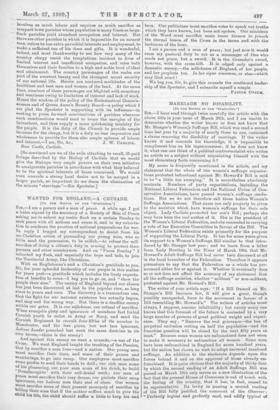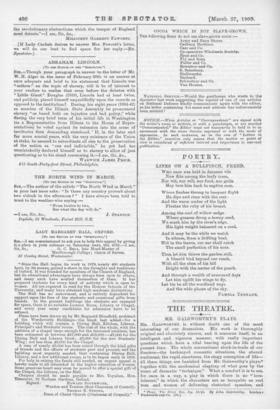MARRIAGE NO DISABILITY.
rro THU nrwros. TIIN osrsoarroa..1
SIR,—I have read through twice carefully the article with the above title in your issue of March 20th, and I am unable to determine whether the writer knows or does not know that Mr. Stanger's Wornen:s Suffrage Bill, which was read a second time last year by a majority of nearly three to one, contained a clause removing the disability of marriage. If the writer knows it and conceals his knowledge, it is impossible to compliment him on his ingenuousness; if he does not know it, what can one think of a political controversialist who writes an article on a subject without acquainting himself with the most elementary facts concerning it ?
My name is frequently mentioned in the article, and my statement that the whole of the women's suffrage organisa- tions protested beforehand against Mr. Howard's Bill is said to be "a little too sweeping." It is nevertheless absolutely accurate. Numbers of party organisations, including the National Liberal Federation and the National Union of Con- servative Associations, have passed women's suffrage resolu- tions. But we do not therefore call these bodies Women's Suffrage Associations. That name can only properly be given to the societies which have women's suffrage for their sole object. Lady Carlisle promoted her son's Bill ; perhaps she may have been the real author of it. She is the president of the Women's Liberal Federation, and she succeeded in carrying a vote of her Executive Committee in favour of the Bill. The Women's Liberal Federation exists primarily for the purpose of supporting the Liberal Party. It has for some years given its support to a Women's Suffrage Bill similar to that intro- duced by Mr. Stanger last year; and we learn from a letter from Lady Bunting in the Times of March 19th that Mr. Howard's Adult Suffrage Bill had never been discussed at all in the local branches of the Federation. Therefore it appears premature to say that the Federation as a whole has pro- nounced either for or against it. Whether it eventually does so or not does not affect the accuracy of my statement that all the suffrage societies, whether " militant" or non-militant, protested against Mr. Howard's Bill.
. The writer of your article says: "If a Bill framed on Mr. Stauger's Bill becomes law, it will give a great, though possibly unexpected, force to the movement in favour of a Bill resembling Mr. Howard's." The writers of articles must always, I suppose, assume infallibility ; but surely every one knows that this forecast of the future is contested by a very large number of persons of great political weight and experi- ence. They say : "Remove the real grievance—the ban of perpetual exclusion resting on half the population—and the franchise question will be closed for the next fifty years at least." Because some women are enfranchised does not seem to make it necessary to enfranchise all women. Some men have been enfranchised in England for seven hundred years, but the nation has shown no wish to adopt universal manhood suffrage. An addition to the electorate depends upon the forces behind it and on the approval of those already en- franchised. It is quite obvious that the majority, of thirty-four by which the second reading of an Adult Suffrage Bill was passed on March 19th only serves as a new illustration of the fact that the present House of Commons is out of touch with the feeling of the country, that it has, in fact, ceased to be representative. Its levity in passing a second reading of the Bill fully justified the comment of the Observer : "Perfectly logical and perfectly mad, and oddly typical of
the revolutionary abstractions which the temper of England most detests."—I am, Sir, &e.,
MILLICENT GARRETT PAWCETT.
[If Lady Carlisle desires to answer Mrs. Fawcett's letter, we will do our best to find apace for her reply.—ED. ,$peetator.]











































 Previous page
Previous page